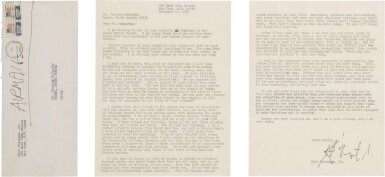
Vonnegut, Kurt | Vonnegut's stirring response to the censorship and burning of Slaughterhouse Five
Lot Closed
January 25, 08:52 PM GMT
Estimate
5,000 - 7,000 USD
Lot Details
Description
Vonnegut, Kurt
Typed letter signed ("Kurt Vonnegut"), to Charles McCarthy, head of the school board at Drake High School in North Dakota, responding to the censorship and burning of Slaughterhouse Five at Drake
2 pp (241 x 189 mm, sight), 349 East 54th Street, New York, N.Y. 10022, November 16, 1973; both pages handsomely matted and framed together with the postmarked envelope (overall 368 x 655 mm); horizontal folds, not examined out of frame.
Vonnegut's emphatic rejoinder to the burning of Slaughterhouse Five at a North Dakota high school
In October, 1973, a high school in Drake, North Dakota made headlines when the school board ordered the destruction of 32 copies of Slaughterhouse Five, electing, apparently without much thought, to use the sensational method of destruction by furnace. Vonnegut's anti-war novel had been assigned by sophomore English teacher Bruce Severy, which prompted a special school board meeting where novel was deemed unsuitable for 15-year-old readers.
Reporters descended upon the small town of Drake, and the citizens were by all accounts dumbfounded by their newfound notoriety. At the time, the author offered an economical statement on the affair: "Everybody's against book burning." Vonnegut, it would be revealed later, chose to express the depth of his outrage privately and directly to the chairman of the Drake School Board, Charles McCarthy.
In the present letter, Vonnegut offers an impassioned argument against the actions of the Drake School Board, quoting extensively, but in part:
"If you were to bother to read my books, to behave as educated persons would, you would learn that they are not sexy, and do not argue in favor of wildness of any kind. They beg that people be kinder and more responsible than they often are. It is true that some of the characters speak coarsely. That is because people speak coarsely in real life. Especially soldiers and hardworking men speak coarsely, and even our most sheltered children know that. And we all know, too, that those words really don’t damage children much. They didn’t damage us when we were young. It was evil deeds and lying that hurt us."
He goes on: "I read in the newspaper that your community is mystified by the outcry from all over the country about what you have done. Well, you have discovered that Drake is a part of American civilization, and your fellow Americans can’t stand it that you have behaved in such an uncivilized way. Perhaps you will learn from this that books are sacred to free men for very good reasons, and that wars have been fought against nations which hate books and burn them. If you are an American, you must allow all ideas to circulate freely in your community, not merely your own."
"If you and your board are now determined to show that you in fact have wisdom and maturity when you exercise your powers over the education of your young, then you should acknowledge that it was a rotten lesson you taught young people in a free society when you denounced and then burned books–books you hadn’t even read. You should also resolve to expose your children to all sorts of opinions and information, in order that they will be better equipped to make decisions and to survive."
"Again: you have insulted me, and I am a good citizen, and I am very real."
You May Also Like



